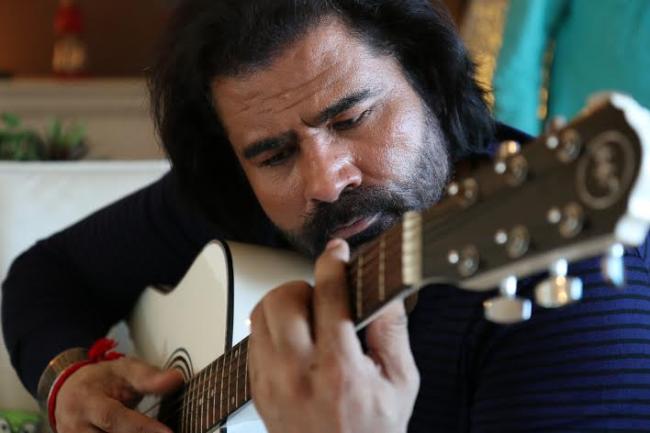
Music straddling boundaries
Classical, Sufi and Bollywood playback singer and song-writer Shafqat Amanat Ali Khan from Pakistan is once again making music waves in India with a brand new album, Muh Dikhai, his third solo after Tabeer (2008) and Kyun Dooriyan (2010).
Shafqat burst on the Bollywood scene in 2006 when musician Shankar Mahadevan of the Shankar Ehsan Loy trio made him sing Mitwa from Kabhi Alvida Na Kehna. It became an instant hit, followed by an equally popular number, Yeh Hausla from the Nagesh Kukunoor film Dor. Earlier, many had also heard him in Khamaj (Mora Sayyian) and Tere Bina, two tracks that Kukunoor had used in his film Hyderabad Blues 2 from Shafqat’s Sagar album.
In a career spanning around ten years in Bollywood, Shafqat has had innumerable hits that include Tere Naina (My Name Is Khan), Bin Tere (I Hate Luv Stories), Kyun Mein Jaagoon (Patiala House), Dildara (Ra One), Darmiyaan (Jodi Breakers), Phir Le Aya Dil (Barfi), Teri Jhunki Nazar (Murder 3), Raske Bhare Tore Naina (Satyagraha), Allah Waaryiaan (Yaariyan), Manchala (Hasee to Phasee) and, more recently, Main Nahi Jana Pardes (Tevar).
At present, Shafqat has several Bollywood playback assignments in the pipeline but says he cannot reveal them right now.
The playback experience, Shafqat says, has taught him to work on different tones and sounds for different situations in a movie. “Sometimes new producers or composers are hesitant to convey what they have in mind. So you have to rely on your experience to read and interpret. This is something that only comes from the experience of working with different music producers,” explains the singer who teamed up with some of the frontline music directors, including Shankar Ehsan Loy, Sajid-Wajid and Pritam.
Being the son of the legendary Pakistani singer Ustad Amanat Ali Khan, Shafqat is part of the nine-generation-old famed Patiala gharana. He started taking music lessons at the tender age of four and although his first teacher was his grandfather, Ustad Akhtar Hussain Khan, Shafqat has often spoken of his rather strict grandmother who ensured that the children in the family never missed a riyaz session. “The discipline she inculcated in me and the way she passed on anecdotes and stories behind the ragas and an overall holistic knowledge, led me to an understanding of each bandish. She told us everything one needed to know in order to carry the legacy forward and become a torch-bearer of such a great lineage.”
On his new album Shafqat says that it has come after a gap of five years due to a busy schedule filled with travel and tour commitments. “So the name Muh Dikhai (showing my face) seemed apt,” he says.
The album is a melange of genres and styles, ranging from pure Sufiana kalam to rock, pop, ghazal and semi-classical. “I have tried my best to keep the album different from the previous ones and I think I managed it to quite an extent. It also has a lot of Punjabi tracks as compared to the previous ones,” Shafqat says.
One of his own favourites in the album is a Punjabi track by Mohan Singh with the eponymous title. Except for two tracks, the rest in the seven have been composed by the singer himself and except one, written by him too. “There are two arrangers who have worked on the album and both are extremely talented,” he informs, referring to Zeeshan Haider and Sanval, with the latter providing back-up vocals as well.
Once the front-man of the band Fuzon which subsequently broke off, facilitating the take-off of his solo career, Shafqat has extensively used the social media to unveil Muh Dikhai. “Most albums are now released first on social media and digitally as physical format sales are at an all-time low,” he informs, adding, CDs will, however, be available.
Since social media is all about establishing a direct contact with and receiving feedback from fans, it only makes sense to promote the album through these platforms as much as through any other medium, he feels.
Ask him on his mental preparations before the onset of the process of creating a new album, he observes: “I know what my fans like as I constantly receive their feedback. So I create some tracks which I know are definitely going to be liked.” But every album also has some tracks which are his own recommendations where he tries something new, he says.
Piracy is an area of concern and Shafqat strongly feels music labels need to join hands to get illegal websites and platforms banned and that governments should take steps. “We only encourage our fans to buy legal music. If these steps are taken seriously, the music business will be able to exist and thrive,” he says.
He does not draw flak back home in Pakistan for being a frequent performer in India, he emphasises, adding that all the musicians and cultural ambassadors from both countries are playing a vital role to bridge the gap by strengthening this bond through their music and ignoring the political agendas.
Acknowledging the adulation from his fans in India, Shafqat feels musicians from both India and Pakistan have taken music to a level where they have proved that it is beyond boundaries.
Support Our Journalism
We cannot do without you.. your contribution supports unbiased journalism
IBNS is not driven by any ism- not wokeism, not racism, not skewed secularism, not hyper right-wing or left liberal ideals, nor by any hardline religious beliefs or hyper nationalism. We want to serve you good old objective news, as they are. We do not judge or preach. We let people decide for themselves. We only try to present factual and well-sourced news.







